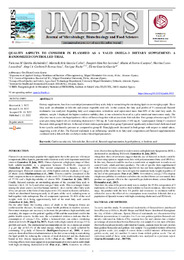Título :
Quality aspects to consider in flaxseed as a valid Omega-3 dietary supplement: a randomized controlled trial |
Autor :
García-Hernández, Vanesa M.
Beltrá García-Calvo, Marta 
Sánchez-Soriano, Joaquín
Iborra-Campos, María A.
Cano-Lamadrid, Marina
Carbonell-Barrachina, Ángel A.
Roche, Enrique 
García García, Elena  |
Editor :
Slovak University of Agriculture in Nitra |
Departamento:
Departamentos de la UMH::Biología Aplicada |
Fecha de publicación:
2022-12-01 |
URI :
https://hdl.handle.net/11000/35222 |
Resumen :
Dietary supplements, based on essential polyunsaturated fatty acids, help in normalizing the circulating lipids in overweight people. These
fatty acids are abundant in fish oils and certain vegetable seed oils. In this context, the fatty acid profile of 9 commercial flaxseed
trademarks was analyzed. Regarding fatty acid composition, α-linolenic acid represented more than 60% of the total fatty acids. In
addition, sample 3 displayed the highest oxidative stability; thus, it was selected to be used in a pilot nutritional intervention study. The
objective was to assess the hypolipidemic effects of flaxseed together with an isocaloric fish-rich diet. Two groups of women aged 25-70
years presenting high levels of circulating cholesterol (> 200 mg dL-1
) and triglycerides (>150 mg dL-1
) participated. Group F consumed
flaxseed, while group D did not. At the end of intervention, participants from group F presented significantly reduced total cholesterol and
lower systolic and diastolic pressure as compared to group D. Triacylglycerols decreased in both groups with respect to initial values,
suggesting a role of diet. The flaxseed trademark is an influencing variable in its fatty acid composition and flaxseed supplementation
combined with a fish-rich diet can help to reduce blood lipid parameters.
|
Palabras clave/Materias:
cardiovascular risk
fish-rich diet
flaxseed oil
flaxseed supplementation
hyperlipidemia
α-linolenic acid |
Área de conocimiento :
CDU: Ciencias puras y naturales: Biología |
Tipo de documento :
info:eu-repo/semantics/article |
Derechos de acceso:
info:eu-repo/semantics/openAccess
Attribution-NonCommercial-NoDerivatives 4.0 Internacional |
DOI :
https://doi.org/10.55251/jmbfs.5932 |
Publicado en:
Journal of Microbiology, Biotechnology and Food Sciences (JMBFS) 12(3), e5932 |
Aparece en las colecciones:
Artículos - Biología Aplicada
|
 La licencia se describe como: Atribución-NonComercial-NoDerivada 4.0 Internacional.
La licencia se describe como: Atribución-NonComercial-NoDerivada 4.0 Internacional.
.png)
